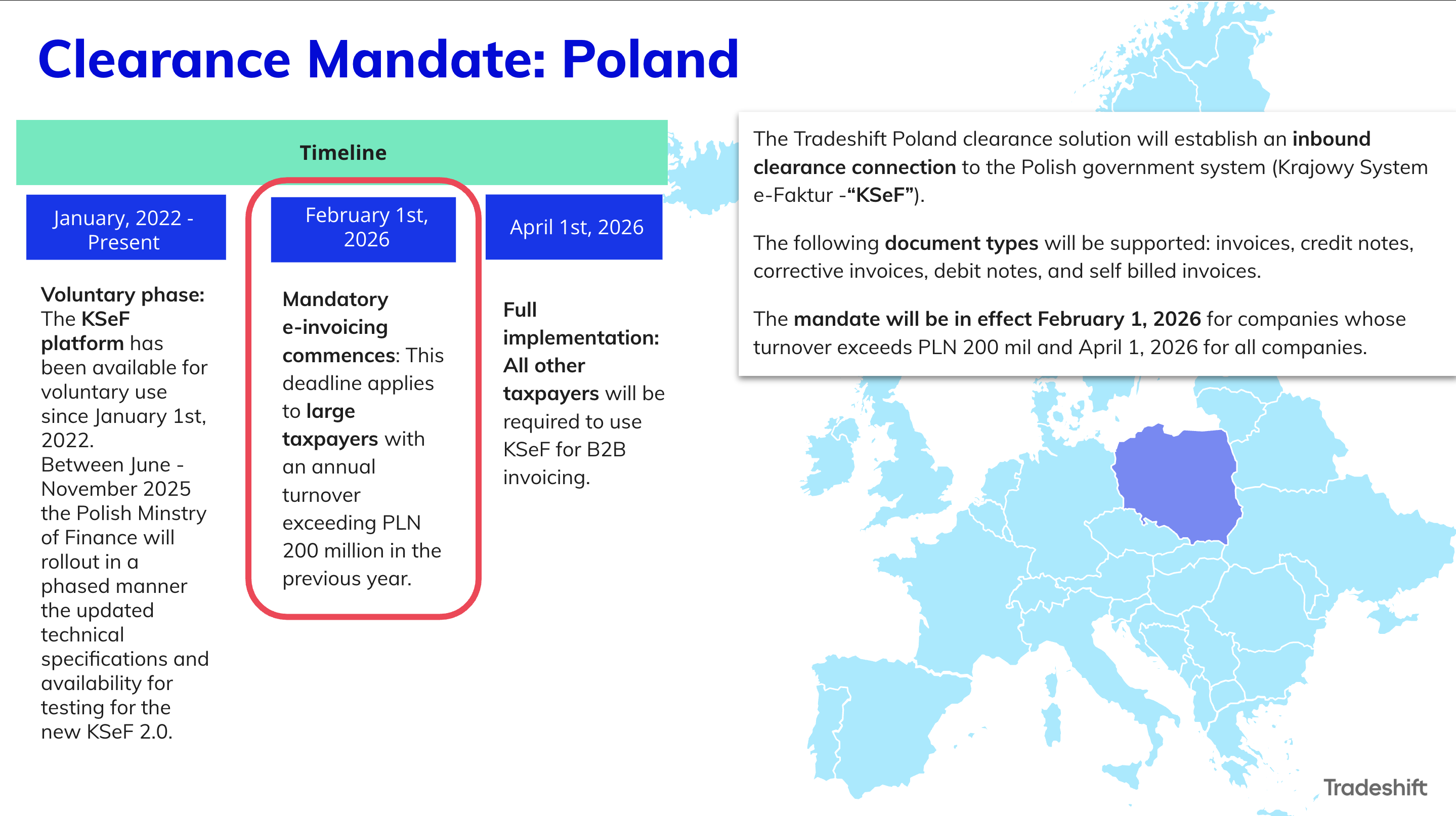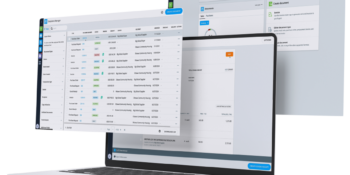Poland’s e-Invoicing mandate: How to prepare for KSeF compliance by 2026
Everything Tax, Finance, and IT Teams need to know about the B2B e-Invoicing mandate in Poland
By Ioana Ploesteanu, Product Marketing Manager, Tradeshift
Poland is locking in its commitment to mandatory B2B e-invoicing. After months of speculation and a delayed rollout, the Polish Ministry of Finance has officially confirmed that the KSeF platform will become the only legal channel for structured invoice exchange starting in 2026. No more extensions, no more ambiguity, just a clear deadline and a countdown.
This is a nationwide change that will impact how businesses issue, receive, and process invoices every day. Whether you’re running a finance team at a multinational or managing AP for a mid-sized Polish company, the message is the same: it’s time to prepare.
👉 Download our whitepaper and overcome the complexities of global e-invoicing mandates.
Mandate Rollout Timeline: What’s Ahead
The KSeF rollout will proceed in two phases:
- February 1, 2026: Mandatory for companies with annual turnover exceeding PLN 200 million (~EUR 46 million).
- April 1, 2026: Mandatory for all other VAT-registered businesses operating in Poland.
These dates mark the end of paper and PDF invoices for B2B transactions. From then on, all invoices must be issued and received through KSeF in a structured XML format (FA(3)). The platform will assign a unique KSeF ID to each invoice, validate it, and archive it for 10 years.

Who’s Affected?
The mandate applies to all VAT-registered businesses in Poland, including foreign entities with a fixed establishment in the country. This includes:
- Large enterprises: Immediate compliance required by February 2026.
- SMEs and microbusinesses: Mandatory compliance by April 2026.
- Foreign companies: If you issue invoices under Polish VAT, you must comply.
B2C transactions remain optional under KSeF, and paper or PDF formats will still be allowed for consumer invoices.
How to Prepare for the Mandate in Poland
With the timeline locked in, businesses should take the following steps to ensure e-invoicing compliance:
1. Understand the Technical Requirements
Familiarize yourself with the FA(3) structured invoice schema and KSeF API documentation. These specifications will be published in June 2025, providing detailed information on the logical structure of invoices, API integration, and the testing schedule.
2. Plan for Integration and Testing
Starting September 30, 2025, businesses can begin testing the new KSeF 2.0 API. Additionally, a test version of the KSeF 2.0 Taxpayer Application will be available in November 2025. Utilize these opportunities to ensure your systems are compatible and functioning correctly.
3. Adapt Your Invoicing Processes
The KSeF platform requires invoices to be in a structured XML format. Unstructured attachments like PDFs or JPEGs will not be accepted. If your business relies on such attachments, consider embedding links within the invoice content or using structured attachments in XML format.
4. Engage with Service Providers
Collaborate with e-invoicing compliance software providers, such as Tradeshift, to ensure seamless integration with KSeF. These partners can assist in adapting your systems to meet the new requirements and avoid disruptions to your accounts payable and receivable processes.
✨ To learn more about the latest e-Invoicing compliance changes, check out our Spring Release blog post.
With mandatory e-invoicing coming to Poland you have to make sure your invoicing systems, workflows, and teams are ready for a new digital reality. If you’re still running manual processes or relying on PDFs, now’s the time to modernize. Get ahead of the curve, avoid last-minute scrambles, and position your business to run smoother under the new mandate.
How can Tradeshift help with e-Invoicing compliance in Poland?
Tradeshift’s compliance-as-a-service and AI-powered AP automation solutions support digital transformation while ensuring adherence to e-Invoicing and tax clearance mandates. Our track record includes successful implementations for major clients such as AirFrance, Disneyland Paris, DHL, and Schaeffler.
We currently offer compliance-as-a-service in 70 countries, streamlining tax clearance in 12 and e-Invoicing in others, and our platform is localized in 26 languages. Our support extends to countries with B2B e-Invoicing or tax clearance mandates, including France, Germany, Spain, Belgium, and Australia, with plans to expand into other European and APAC countries. We continuously monitor global regulations to update our roadmap and maintain compliance excellence.
Among our compliance strengths, we are a certified Peppol Access Point provider, we offer unique cross-zone fapiao e-Invoicing in China, and we were also among the first registered PDPs (PDP immatriculée) in France.
Penalties for non-compliance are increasing. Is your business compliant?
You may also be interested in
Germany update: e-Invoicing mandate finalised
The Growth Opportunities Act’s (Wachstumschancengesetz) e-Invoicing mandates have been reinforced in the final guidelines, offering greater specificity and clarity. Are you ready?
Spring 2025 product release: e-Invoicing compliance and AI
The Spring 2025 Tradeshift product release is here, introducing new e-invoicing compliance features and AI-powered capabilities that benefit both AP and AR teams. In this article, we’ll highlight some key updates.
Poland’s mandatory e-Invoicing system postponed
Polish businesses are getting a reprieve on mandatory B2B e-invoicing clearance. Originally planned for July 2024, the new Krajowy System e-Faktur (KSeF) system will now be implemented in a staged rollout starting in February 2026. In this blog, you’ll learn about the latest milestones and timelines, upcoming changes, and how to prepare your business for the new Polish CTC clearance model.
ViDA Update March 2025: The EU adopts ViDA (VAT in the Digital Age)
The ViDA rules and its three pillars will digitize VAT reporting obligations for companies trading across EU borders by 2030, mandate online platforms to pay VAT on short-term rentals and passenger transport services in most cases where individual providers don’t charge VAT, and enhance online VAT one-stop-shops to simplify VAT registration for businesses operating in multiple member states.



